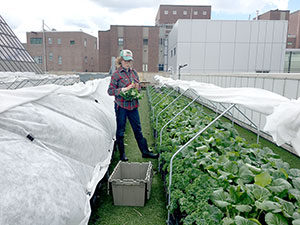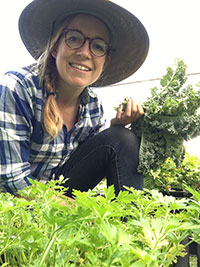
Boston Medical Center’s rooftop farm manager Lindsay Allen spoke at an event sponsored by the Somerville Public Library where the benefits of urban rooftop gardening were discussed.
By Isabel Sami
The Somerville Public Library hosted an event on urban gardening held at Remnant Brewery on Wednesday, February 5. Speaking at the event was Lindsay Allen, a farmer and educator who is currently the farm manager at Boston Medical Center’s rooftop farm and also operations director at Higher Ground Farm.
Allen says the people at BMC believe that food is medicine, so all the produce harvested from the rooftop farm is donated to the food pantry in the hospital. Patients with food insecurity are able to use the pantry, with the added opportunity to take free cooking classes by licensed dieticians in BMC’s teaching kitchen to learn how to cook what they take home.
Other functions from the rooftop farm, which is about 7000 square feet and started nearly four years ago, include an affordable in-hospital farmers market once a week, a summer camp for young patients and Boston School District students, tours and volunteer work, and beekeeping. All activities and programs on the farm are free for the community.
BMC aims to be carbon neutral by 2021, an initiative made possible due to the environmental benefits of the rooftop farm. The farm reduces the heating and cooling needs of the building by 20 percent, captures rainwater, and reduces the distance food travels.

Lindsay Allen
Allen has worked in agriculture for over 10 years and at BMC’s rooftop farm for the past three-and-a-half years. She says she’s an urban gardener because she’s interested in connecting communities with the factors that sustain us, such as food and water, which are hard to connect to in a city context. “Gardens and farms are a place where we can reconnect with those things and be in a deeper relationship with them,” Allen said.
Allen gave tips to community members interested in growing their own food in gardens at home. Her main tip is to get creative. If a house doesn’t have space for a garden, people can plant pepper seeds in jars or buckets outside their front door. Using vertical spaces is another way to get creative, such as by making herb spirals or hanging potted plants. For renters, sack gardens are temporary and portable planters. She says planting inside anything that holds soil and allows drainage is acceptable as long as it allows enough root space.
Allen advises making gardens in front yards instead of backyards. “I feel like there’s this garden shaming where everyone wants to put their gardens in the backyard and I think it’s a missed opportunity for so much,” she says, adding that gardens are a point of connection between neighbors who may normally never speak or see each other, allowing people to teach each other about gardening.
Testing soil before planting directly in the earth is also important so food won’t contain lead or chemicals that may be found in dirt. UMass Amherst has a soil testing lab where people can send samples of their dirt and receive results about levels of lead or nutrients. More information can be found at soiltest.umass.edu. If the soil has lead, raised beds solve this issue.
Factors Allen says to consider when planting any crop are space and light. Some plants need more space for roots than others, so research if a plant needs 12 inches for roots compared to six inches before planting. Some plants may need light for between four to eight hours a day, and if they are planted in a space where they only get light for two hours, they will not thrive. Seasonal changes also affect light, so testing the lighting in different areas of the yard is crucial.
Allen is motivated by the climate crisis and food access in low-income communities. Growing food in cities so food doesn’t have to travel lowers the rate of emissions, and it becomes more accessible to people who cannot always afford costly organic produce.
“Right now, gardening is a privilege, but I think it should be a right,” Allen says. “We all should have a right to grow our own food, and to have that connection to the things that sustain us.”















Reader Comments